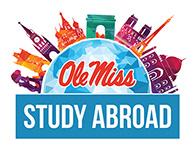Benefits of Study Abroad
Introduction
Most often, faculty members considering study abroad have a strong motivation to share their experience in a particular region of the world with UM students. You may already be planning a potential itinerary and how you will connect your lectures with first-hand interaction in cultural or social settings. This section will help you think through how your project connects to larger university academic goals and consider some of the programming options that are available to you.
Goals
Recent research on learning abroad shows that students learn differently when they are taught the same subject matter on campus as compared to a study abroad situation. How will your study abroad course be different from the same course taught on the UM campus?
Academic Development and Intellectual Growth
Study abroad can…
-
provide a new perspective on the major through exposure to coursework based in different cultural frames of reference and/or taught by local instructors
-
expose students to academic content not available on the UM campus
-
contextualize learning by linking it to local realities (including service learning) and related global dimensions
-
provide structured opportunities for comparative analysis, critical and creative thinking, and problem solving
-
enhance students’ country-, region-, and culture-specific learning through pre-departure, on-site, and post-program experiences focused on geography, history, politics, literature, etc.
-
motivate students to begin or continue learning a foreign language by exposing them to structured situations, inside and outside the classroom, which will significantly facilitate the development of language skills in the context of culture
-
engage students in research projects with local students and faculty
-
provide opportunities for students to give presentations about their study abroad projects/experiences on the UM campus and/or at meetings of professional associations
-
stimulate students’ sense of curiosity through engagement with the local culture
Personal Growth
Students can develop personally by…
-
forming meaningful relationships and friendships with local people through home stays, local clubs, volunteer opportunities, etc.
-
reevaluating their values, vocation, and personal ethics, facilitated by reflective journaling assignments and structured reflection sessions
-
experiencing a sense of self-efficacy by mastering and reflecting on difficult situations
-
reflecting on issues of personal identity and interdependence in a global context
-
developing a sense of social responsibility through engagement with local communities
-
increasing tolerance by exposure to unfamiliar situations
Professional Development
Study abroad programs can…
-
provide opportunities to students for meeting professionals in their chosen fields of study so that they may learn how to relate professionally with culturally different others (in labs, businesses, professional organizations)
-
integrate internships, service learning, student teaching abroad, community engagement, and other opportunities for experiencing local work life
-
provide opportunities for students to reflect on skills learned and knowledge gained and make connections between learning during study abroad and their career paths
-
provide a structure for exploring future professional direction
Skills for Engaging Culturally Different Others
Study abroad programs can facilitate intercultural learning by…
-
enhancing students’ self-awareness and understanding of their own culture by providing opportunities to compare and contrast host country customs, values, and traditions with their own
-
allowing time for structured and unstructured encounters with local people and customs in a variety of contexts
-
providing opportunities for exposure to, interaction with, and reflection on the everyday aspects of the host culture through taking classes at the local university, engaging in recreational activities with local students, home stays, service learning opportunities, individual projects, participation in local customs/celebrations, etc.
-
encouraging students to experience the world through the eyes of the other culture by exposing them to the literature and arts of the local culture
-
preparing students for the intercultural experience through pre-departure orientation, readings, and other media
-
helping students realize and articulate their intercultural learning and identity development through post-program reflection
-
requiring attendance at regularly scheduled on-site reflection sessions during which critical encounters with the host culture are analyzed
-
helping students make connections between the host country’s culture, society, history, politics, and arts
On-campus Internationalization at UM
Our students’ international learning experiences add value to the on campus experience by…
-
infusing the classroom with the various cultural perspectives, from current international students on the UM campus to returned study abroad students, to better prepare students for study abroad and be more receptive to global or comparative perspectives
-
building on faculty’s regional expertise and connections to identify suitable locations and partner institutions, linking study abroad to faculty scholarship and research, and expanding existing institutional links and networks that contribute to the department’s research agenda
-
including student research on study abroad programs
-
linking faculty and student expertise gained through study abroad with strategic initiatives at the departmental, college, and university levels, thus make study abroad programming sustainable
